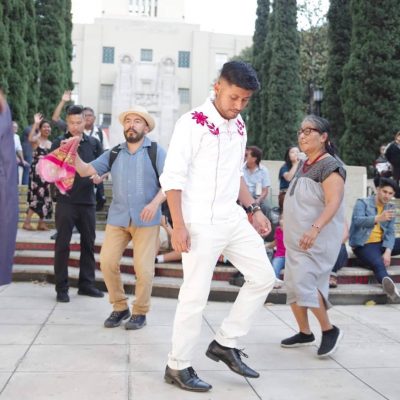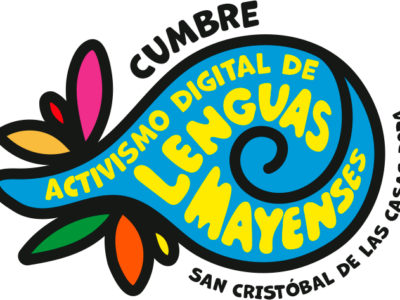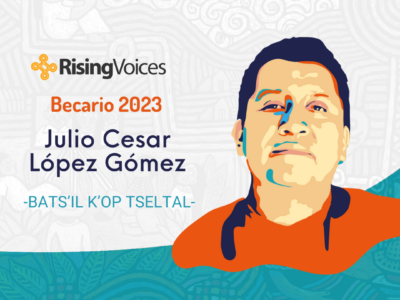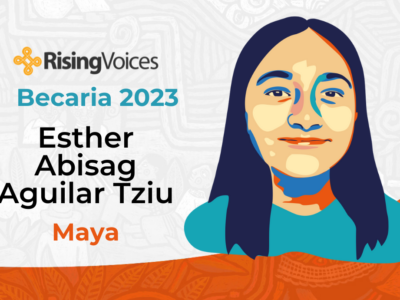
Photograph provided by Claudio Hernandez
In 2020, we continue our social media campaign by inviting different hosts to manage the @ActLenguas (Language Activism) Twitter account and share their experiences with the revitalization of and advocacy for native languages. This profile post is about Claudio Hernandez (@clau_deeoh) and what he plans to discuss during his week as a host.
Rising Voices (RV): Please tell us about yourself.
Mi nombre es Claudio Hernandez, tengo 26 años, vivo en Los Angeles. California, y nací en Santa Maria, California. Ahí fue donde muchos del pueblo de mi padre, Santa Cruz Mixtepec (Yucha Nchaa/Rio Azul), llegaron a vivir. Este pueblo pertenece al municipio de San Juan Mixtepec que es la variante de Tu’un Savi que hablamos. Soy trilingüe, hablo Español, Inglés, y Tu’un Savi.
Soy estudiante de Maestría en mi primer año. Estudio Antropología Lingüística en la Universidad Estatal Californiana de Los Angeles, ahí soy cofundador del Language Documentation y Revitalization Space (LADORES) donde creamos materiales audiovisuales en lenguas indígenas para ser usadas de manera didáctica. Estas las publicamos por Facebook, Twitter, Instagram. Por ya casi un año he trabajado para una organización no lucrativa liderada por mujeres llamada Comunidades Indígenas en Liderazgo (CIELO) que por parte lucha por los derechos lingüísticos de comunidades indígenas.
My name is Claudio Hernandez, I am 26 years old, I live in Los Angeles, California, and I was born in Santa Maria, California. That's where many people from my father's Mixtepec (Yucha Nchaa / Rio Azul) community in Santa Cruz, came to live. This town belongs to the municipality of San Juan, where people speak a Mixtepec language variant, Tu’un Savi. I am trilingual, I speak Spanish, English, and Tu’un Savi.
I am a first year student in the Master's degree program in Linguistic Anthropology at the California State University of Los Angeles. There I am also a co-founder of the Language Documentation and Revitalization Space (LADORES) where we create audiovisual didactic materials in indigenous languages. We publish these on Facebook, Twitter, Instagram. For almost a year now I have worked for a women-led nonprofit organization called Indigenous Communities in Leadership (CIELO) that is fighting for the linguistic rights of indigenous communities.
RV: What is the current status of your language on the internet and offline?
Actualmente Tu’un Savi de Mixtepec puede aparecer que es hablada vigorosamente. Pero eso no es el caso. La mayoría de la gente que lo habla son los ancianos, la mayoría de la generación después de ellos es bilingüe en Español y Tu’un Savi pero muchos no han ensenado la lengua a sus hijos debido a la discriminación. Los que han logrado conservar la lengua, mantienen o comparten sus conocimientos publicando videos o escribiendo Tu’un Savi de Mixtepec de manera formal e informal por YouTube, Facebook, y Instagram.
Currently, Tu’un Savi variant of the Mixtepec language may appear to be vigorously spoken. But that is not the case. Most of the people who speak it are the elderly, and the majority of those younger than them are bilingual in Spanish and Tu’un Savi, but many have not taught the language to their children due to discrimination. Those who have managed to preserve the language, maintain or share their knowledge by publishing videos or writing in the Tu’un Savi variant of Mixtepec formally and informally on YouTube, Facebook, and Instagram.
RV: On what topics do you plan to focus during the week that you’ll manage the @ActLenguas Twitter account?
Durante la semana que maneje la cuenta de @ActLenguas planeo enfocarme por manera de reflexión con apoyo de algunas lecturas académicas en los siguientes temas: como el desplazamiento económico, la exclusión institucional, y la discriminación han disminuido el numero de nuestros hablantes en los Estados Unidos y en México pero también como nuestras comunidades resisten, planeo platicar lo que conozco de la identidad “Na Uvi” un término Tu’un Savi que se usa para describir a personas LGBT en la comunidad, planeo compartir palabras en el variante mixtepecano de Tu’un Savi además de reflexiones sobre algunas de esas palabras y del pueblo, planeo hablar sobre la migración hasta los Estados Unidos, planeo hablar sobre la identidad, y finalmente planeo hacer preguntas sobre el uso de la lengua para discusión.
During the week that I'll manage the @ActLenguas Twitter account, using also academic readings, I plan to focus on the following topics: how economic displacement, institutional exclusion, and discrimination have decreased the number of our speakers in the United States and in Mexico. Also, as our communities resist, I plan to discuss what I know about the “Na Uvi” identity, a Tu'un Savi term that is used to describe LGBT people in the community. I plan to share Tu'un Savi words, plus reflections on some of those words and people speaking this language. I plan to talk about migration to the United States, about identity, and finally I plan to ask questions in order to start a discussion about language use.
RV: What are the main motivations for your digital activism for your language?
Lo que me motiva a participar en el activismo digital en Tu’un Savi es mi experiencia con la discriminación. Al crecer en Santa Maria, un lugar donde hay discriminación dirigida a comunidades Oaxaqueñas, note que muchos de mis primos ya no querían hablar Tu’un Savi. Cuando visito al pueblo, los jóvenes de mi edad y menor también expresan lo mismo. Hay un menosprecio hacia nuestras lenguas que se puede deshacer con la visibilidad, revitalización, documentación, y reflexión de nuestras lenguas para abrir el camino y darles oportunidad a nuevos hablantes o a hablantes que quieren re-aprender sus lenguas, y también para visibilizar historias y saberes que ya no se cuentan por diferentes razones. Lo que sueno para mi lengua son hablantes de diferentes edades compartiendo las historias de cada generación intercambiando y visibilizando saberes que se han sido forzados a esconder por 500 años y más de colonización.
What motivates me to participate in digital activism for Tu’un Savi is my experience with discrimination. Growing up in Santa Maria, a place where there is discrimination against Oaxacan communities, I noticed that many of my cousins no longer wanted to speak Tu’un Savi. When I visit the town, young people my age and younger also express the same idea. There is a disregard for our languages that can be undone through the visibility, revitalization, documentation, and reflection on our languages. These strategies will give opportunities to new speakers or those who want to re-learn their languages, and also will make visible stories and knowledge that are not taken into account for different reasons. What I dream of for my language are speakers of different ages to share the stories of each generation, exchange and make visible knowledge that was forced to be hidden because of more than 500 years of colonization.



